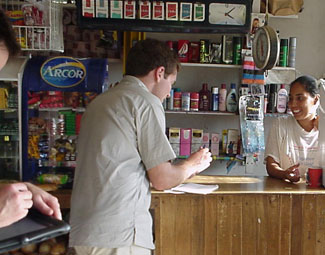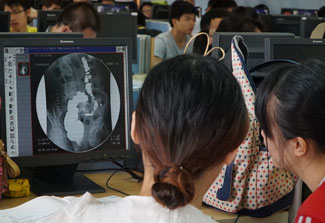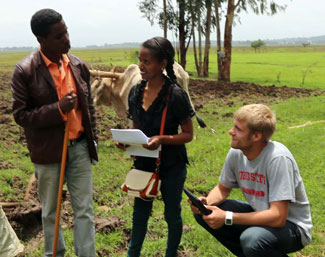Fogarty to award nearly $3M to advance ICT for research and training
July / August 2015 | Volume 14, Issue 4
Fogarty plans to award up to $2.9 million over the next three years through its Global Health Research and Research Training eCapacity Initiative. Nine new grants will support innovative research education programs to better integrate information and communication technology (ICT) into research and training in low-resource settings. Funded projects vary widely and address a number of ICT needs - from studying social media to enhance mental health care, to advancing disease modeling skills to improve public health decision making, to incorporating ICT into cardiovascular research.
The grants, each for up to three years, will leverage capacity already established by Fogarty programs in several dozen low- and middle-income countries (LMICs). View a full list of 2015 eCapacity grant awards. Some grants involve individual countries, whereas others aim to expand regional capacity.

Photo courtesy of Dr. Timothy Dye/University of Rochester
Researchers in Costa Rica will test ICT innovations in the
field to assess their effectiveness in local contexts, with
funding from a Fogarty eCapacity grant.
In one project, grantees in 11 Asia-Pacific nations will partner with experts from the U.S., Australia and Norway to develop a six-week ICT curriculum in social epidemiology. Trainees will learn to use Internet-based social media and mobile health to integrate mental health into primary care and women’s health services.
Meanwhile, grantees in Costa Rica and the Dominican Republic will develop informatics skills via a mentored program focused on maternal health. Researchers will test ICT innovations in the field to assess their effectiveness in local contexts and create a collaborative system for sharing new material.
A third multicountry project involves a collaboration among Ethiopia, Kenya and Tanzania. Grantees plan to create a tablet computer and mobile phone application for research data capture, crowd sourcing and analyses. Trainees will conduct mentored ICT projects on infectious disease topics and the team will hold webinars and e-workshops to encourage networking among East African and U.S. partners.
In West Africa, 30 graduate students from Senegal and other Francophone countries will learn how ICT can convey health information and related communication research methods. The project involves using digital hardware and software to collect and analyze data and leverage existing collaborations. Trained experts will stimulate innovation in new medical and health interventions.

Photo courtesy of Drs. Abu Abdullah and Yang Li
A Fogarty eCapacity grant will help researchers in China
build skills and systems to analyze large quantities of
health-related data and to implement health promotion
interventions that use ICT platforms.
Researchers in China, with its enormous population and decentralized health care, aim to build systems to store and analyze large quantities of health-related data and use the evidence to inform policymakers. With their U.S. collaborators, scientists at six Chinese institutions will create a model education program in research informatics and communication science, adapting it as appropriate for different settings.
In India, to enhance evidence-based, data-driven decision making, researchers will use modeling and simulation as they assess the health and economic impacts of disease control strategies. Indian and U.S. researchers will establish a new collaboration network and conduct two small modeling studies.
Zimbabwe has very limited ICT capacity, so a research team will train faculty and clinical investigators how to use technology, as well as establish a cohort of experts who can educate future trainees in basic and advanced research methods. The team will investigate additional avenues to integrate ICT tools, such as text messaging and mobile applications, into research activities.

Photo courtesy of Ohio State University
A multicountry eCapacity project working in Eastern Africa
plans to create an application for research data capture,
crowd sourcing and analyses.
In Zambia, researchers will develop an intensive curriculum in applied public health informatics, including biostatistics, epidemiology, statistical software programming and research ethics. Trainees will receive hands-on mentorship as they acquire skills in data management, analysis and interpretation.
Ghana will likewise develop a new curriculum that incorporates the use of ICT tools into cardiovascular research. Trainees will use iPad mini devices for their own research design and data collection, and will have continuous access to in-person or online ICT support.
2015 Global Health Research and Research Training eCapacity Initiative Grant Awards
eCapacity Building in China for Using ICT in Global Health Research and Training
Boston Medical Center, Boston, Mass.
Principal Investigators: Dr. Abu Saleh Abdullah, Dr. Robert Friedman
NYU/University of Ghana Cardiovascular Research Training eCapacity Initiative
New York University Medical Center
Principal Investigators: Dr. Stephen Wall, Dr. Gbenga Ogedegbe
Bridging the Gap in eCapacity for Global Health Research and Training in Eastern Africa
The Ohio State University, Columbus, Ohio
Principal Investigators: Dr. Wondwossen Gebreyes, Dr. Paul Schopsis, Dr. Diane Gorgas
UCLA-RAES-UCAD Health Communication and ICT Research Education Program
University of California, Los Angeles, Calif.
Principal Investigator: Dr. Deborah Glik
The CIDRZ-UNZA eLearning Platform for Research Training
University of North Carolina at Chapel Hill, N.C.
Principal Investigator: Dr. Benjamin Chi
Empowering Indian Health Researchers with Computational Modeling Tools
University of Pittsburgh, Pittsburgh, Penn.
Principal Investigator: Dr. Clareann Bunker, Dr. Donald Burke, Dr. Saumyadipta Pyne
eCapacity Development and Growth in the ASPIRE Network_eC.ASPIRE
University of Rochester, Rochester, N.Y.
Principal Investigator: Dr. Eric Caine
MundoComm: ICT for Maternal Health in Costa Rica and Latin America
University of Rochester, Rochester, N.Y.
Principal Investigators: Dr. Timothy Dye, Dr. Deborah Ossip
Promoting Research through ICT Excellence (PRICE)
University of Zimbabwe College of Health Sciences, Harare, Zimbabwe
Principal Investigator: Dr. James Hakim
More Information
To view Adobe PDF files,
download current, free accessible plug-ins from Adobe's website.